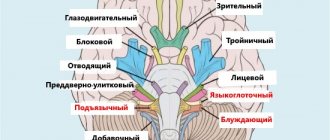Mental infantilism
1.1. Intellectual deficiency in states of mental infantilism - immaturity of the individual with a predominant lag in the development of the emotional-volitional sphere and preservation of childish personality traits (Laseque E.-C., 1864). It is considered by most researchers as a consequence of impaired maturation of the youngest structures of the brain, mainly the systems of the frontal cortex and their connections.
The most likely causes of the development of mental infantilism are heredity, constitution, intrauterine intoxication and hypoxia, birth trauma, toxic-infectious effects in the first years of a child’s life, parenting defects (overprotection, despotism of parents). The prevalence of mental infantilism in the Russian Federation is 10% of children.
Simple (uncomplicated, harmonic) mental infantilism has been studied most thoroughly. At the same time, mental immaturity covers all areas of the child’s activity, including intellectual, but manifestations of emotional and volitional immaturity predominate: increased emotional liveliness, affective instability and rapid satiation of active attention, the predominance of the motive for receiving pleasure, excessive attachment to the mother, fear of everything new. Children are tireless in play, they are characterized by vividness of imagination, imagination, invention, and cheerfulness. However, intellectual interests themselves (inquisitiveness, curiosity) are poorly developed; gaming interests predominate even at school age. Children cannot independently organize their activities and subordinate them to the requirements of the school or team. All this ultimately leads to school immaturity, which becomes apparent in the first grades of school.
In the mental sphere, children with simple infantilism are dominated by concrete-active and visual-figurative forms of thinking, a tendency to imitative activities when performing intellectual tasks, insufficient focus of mental activity, and delayed formation of logical memory.
In contrast to oligophrenia, children with infantilism are characterized by general liveliness, spontaneity, increased interest in the environment, lack of inertia, stiffness of mental processes, they have a richer emotional life, stronger and differentiated attachments, the presence of a wider “zone of proximal development,” and increased suggestibility. The level of their abstract-logical thinking exceeds that of mentally retarded children. The intellectual defect itself is relatively shallow and is largely of a secondary nature, determined by a lag in personality development, that is, it is not mental retardation itself that occurs, but a delay in the rate of mental development (Sukhareva G.E., 1965; Pevzner M.S., 1966 ). The games of infantile children are characterized by activity, independence, elements of creativity, fantasy, and imagination. They have the ability to use help and transfer what they have learned to new material.
The somatic status often reveals signs of immaturity, growth retardation, gracile proportions, but there is no gross dysplasticity characteristic of mental retardation.
With age, manifestations of mental and physical infantilism can be smoothed out, sometimes disappear, and intellectual deficits can be compensated.
With complicated mental infantilism (CHI), in addition to mental immaturity, other pathological manifestations are noted.
The most difficult to differentiate is its first variant – organic infantilism. Patients are characterized by a lack of liveliness and cheerfulness; they are rather euphoric, complacent and disinhibited. Their games are poor, monotonous, devoid of imagination and fantasy, attachments are less deep and differentiated, thinking is more concrete (meaning underdevelopment of the ability to abstract), slow-moving. Individual dysplasias of organs and systems are more common.
The structure of intellectual impairments is of decisive importance in distinguishing from oligophrenia. With organic infantilism, insufficiency of the emotional-volitional sphere and violations of the so-called predominate. prerequisites for intelligence (attention, memory, rate of performance, endurance during mental activity). Actually, insufficiency of mental activity in the form of weakness in the processes of generalization and abstraction is not the main one in the clinical picture; mental operations in general proceed at a satisfactory level. The dynamics of organic infantilism are also more favorable, although a significant part of such children are transferred to a auxiliary school or to education in special conditions.
The cerebrasthenic variant of API, which is very common, is characterized by a combination of signs of childishness (less pronounced than with simple infantilism) with symptoms of irritable weakness (increased excitability, instability of attention, motor disinhibition, easy exhaustion, somatovegetative disorders). In addition, children are more timid, skittish, fearful, are not independent in an unfamiliar environment, and are prone to avoidant behavior.
The neuropathic variant of API, close to cerebrasthenic, is characterized by pronounced inhibited character traits (fearfulness, suggestibility, lack of independence, excessive attachment to the mother, difficulty adapting to children's institutions), disorders of autonomic regulation and a tendency in unfavorable conditions to consolidate asthenic personality traits, a high probability of developing asthenic psychopathy.
Endocrine variants of API are complicated by the addition of psychoendocrine disorders. Thus, with hypogenitalism, signs of infantilism are combined with lethargy, slowness, lack of concentration, and confusion. With pituitary subnanism, features of old age are revealed in the mental and physical appearance of the child, a tendency to teach, grumpiness, etc. The school failure of such children is a consequence of weak willpower, slowness, attention disorders, logical memory, and low development of the ability for abstract logical thinking.
Return to Contents
Intellectual deficiency in infantile states
08/15/2019 Clinic for Intellectual Disabilities. Answers.
The term “infantilism” was introduced by E. Lasegue (Lassegue) in 1864. It denotes a relatively uniform delay in the rate of mental and physical development of a person.
Infantilism is the immaturity of the individual with a predominant lag in the development of the emotional-volitional sphere and the preservation of childish personality traits.
These children are characterized by
immaturity (“childishness”)
. The children are miniature and at the same time proportionally built; their appearance reflects a certain naivety.
Prevalence
mental infantilism, according to psychiatric epidemiology of childhood, is quite significant
- 1.6%.
Etiological
factors causing a delay in the formation of complex specific brain systems are caused by mild metabolic and trophic disorders. Most often these are mild brain lesions - infectious, toxic and others, including trauma and fetal asphyxia. The last trimester of the prenatal period and the period of childbirth are considered especially unfavorable in this regard.
In pathogenesis
In infantilism, the leading role is given to slowing down the rate of maturation of the youngest structures of the brain, mainly the frontal and frontal-diencephalic systems and their connections.
The main clinical sign of mental infantilism is emotional-volitional immaturity
, which is expressed in lack of independence, increased suggestibility, desire for pleasure from gaming activities, carelessness, immaturity of the sense of duty, responsibility, inability to subordinate one’s behavior to requirements, inability to restrain manifestations of feelings, volitional tension.
Children with infantilism are characterized by
: 1) preservation of behavioral traits characteristic of a younger age; 2) greater mental alertness, increased interest in the environment, thirst for new experiences, lack of inertia; 3) the best level of logical processes; 4) greater initiative and independence in gaming activities (vivacity of imagination, fantasy); 5) the ability to make good use of the assistance provided by the teacher; 6) brightness of emotions; 7) lack of dysplasticity in the somatic appearance.
. At an early age, signs of emotional-volitional immaturity and a decrease in the level of behavioral motivation are difficult to identify, therefore, one can essentially talk about mental infantilism only starting from school and adolescence
. Quite typical for children of this age is the predominance of play interests over academic ones, misunderstanding and rejection of the school situation and the disciplinary requirements associated with it, which leads to social and school maladjustment.
In early childhood
establishing mental infantilism, especially its mild forms, is difficult.
Along with emotional-volitional immaturity, mental infantilism in childhood is characterized by “ motor infantilism
” and greater or lesser
borderline intellectual disability
.
Sight
Such a child may be restless and wary, but he is not stupid or senseless.
No wonder the famous Soviet neuropathologist and defectologist G.I. the child's gaze
during the examination . “Look into the child’s eyes more often,” he said.
In adult psychiatry, symptoms of mental infantilism are considered within the framework of personality changes in various mental illnesses (E. Kraepelin).
There are 4 main clinical variants of infantilism: harmonic (simple, uncomplicated), disharmonic, organic (complicated)
and
psychogenic.
Simple harmonic (uncomplicated) infantilism.
Simple infantilism is rare in clinical practice and more often at the level of a subclinical state.
The essence of simple infantilism is the underdevelopment of the emotional-volitional sphere. Intellectual deficiency is of a secondary nature, caused by a lag in the maturation of the components of the developing personality.
In the taxonomy of K. S. Lebedinskaya, this form of infantilism is classified as “ZPR of constitutional origin.” This
-
a uniform delay in the pace of both physical and mental development
, manifested primarily
by the immaturity of the emotional-volitional sphere,
and then of the personality as a whole.
This is a violation of the development process in which the child moves to the next age stage, but the emotional-volitional sphere remains, as it were, at an earlier stage of development, in many ways reminiscent of the structure of the emotional makeup of younger children. Intellectual disability is secondary.
It is believed that maturation in this case lags behind the norm by 1-3 years. This affects both the child’s behavior and his possibilities for social adaptation.
Clinical picture
simple infantilism is characterized by features of immaturity, “childishness” in somatic and mental appearance.
Children look younger than their age and are graceful
. They are characterized by a lively, but superficial curiosity, and general unstable interests in the environment. With full intelligence, there is underdevelopment of intellectual interests, a kind of disproportion: tirelessness in gaming activities and quick distractibility, fatigue when performing tasks that require intellectual, volitional efforts and patience. In this regard, when entering school, children with simple infantilism may experience neurotic reactions and behavioral disorders in response to ordinary educational tasks.
Infantilism is most pronounced at the beginning of schooling, creating the phenomenon of “school immaturity.”
Age dynamics
harmonic infantilism is relatively favorable. Manifestations of simple mental infantilism decrease or completely disappear by approximately 10 years.
V.V. Kovalev (1985) believes that complete normalization of personal properties does not occur and simple infantilism, noted in childhood and puberty, gives way to personal disharmony and ends with accentuation of character or psychopathy of a predominantly unstable or hysterical type.
Disharmonic infantilism
is distinguished
by a combination of signs of emotional-volitional immaturity
, characteristic of simple infantilism, with
individual pathological character traits
, such as affective excitability, conflict, deceit and boasting, selfishness, capriciousness, and increased interest in social excesses. Certain pathological character traits are revealed already in the 1st-2nd year of life in the form of stubbornness, reactions of protest, the desire to insist on one’s own, to offend loved ones, to hurt them.
In older children, the traits of immaturity in the emotional-volitional sphere are “overlaid” by deviant behavior and pathological character traits. The structure and age-related dynamics of disharmonious infantilism make it possible to regard it as a stage of emerging psychopathy.
Organic (complicated, mental) infantilism
–
infantilism associated with psychoorganic syndrome.
The most common option. It develops as a result of organic damage to the brain.
With complicated mental infantilism in the clinical picture, signs of immaturity of the emotional-volitional sphere are combined with
with psychopathological manifestations of one or another
psychopathological syndrome
(psychoorganic, cerebrasthenic, neuropathic, psychoendocrine),
low level of intellectual development, underdevelopment of speech
.
Emotional-volitional immaturity continues to be the leading and defining symptom.
The clinical picture of this form of infantilism is extremely polymorphic
and is determined by the severity of psychopathological symptoms of organic brain damage.
Signs of organic inferiority of the central nervous system are especially clear
are found in the activities of these children.
Clinical variants of organic infantilism: include its cerebrasthenic, neuropathic
and
disproportionate
options, as well as
infantilism in endocrinopathies
.
Psychogenic infantilism
.
This option is the result of abnormal personality formation under conditions of improper upbringing
or
prolonged emotional and social frustration.
With age, an emotionally immature personality develops.
When raised according to the principle of hyperprotection
Along with infantilism, egocentrism, inability to take into account others, extreme lack of independence, passivity, mental intolerance, and inability to exert themselves clearly appear.
Autocratic parenting
children with physical punishment and constant prohibitions contributes to the development and consolidation of emotional-volitional immaturity in the form of reduced initiative activity, insufficient independence, and indecision.
All varieties of psychogenic infantilism are characterized by social immaturity of the individual in the form of insufficiency or absence of higher ethical principles and a system of ideals. In such children, positively oriented social and intellectual interests, the need for work, and a sense of duty remain insufficiently formed; there is a distorted understanding of their social responsibilities and their future. All this forms the basis of deviant behavior
such children.
Classification
Mental infantilism can be congenital and acquired, simple and disharmonious.
In simple (harmonic) a person’s immaturity is characterized by behavior that is inappropriate for his age. There is a uniform delay in mental and physical development.
Disharmonic is simple infantilism with additional characteristics:
- mood swings;
- self-love;
- overestimated or underestimated needs;
- increased affective excitability;
- early sexuality;
- cruelty towards the weak and defenseless, etc.
Acquired infantilism is divided into three groups:
- organic (due to damage to the central nervous system);
- somatogenic (due to endocrine and chronic diseases, damage to internal organs);
- psychogenically conditioned (psychological) as a consequence of excessive parental care, pampering or despotic upbringing.
| Types of infantilism | Description |
| Physiological | Slowing down of growth and development of physiological systems of the body |
| Mental | Characterized by a delay in the rate of mental development |
| Social | Socialization problems, lack of understanding of responsibilities and obligations associated with the process of growing up |
| Legal | Unformed legal knowledge, views and attitudes |





